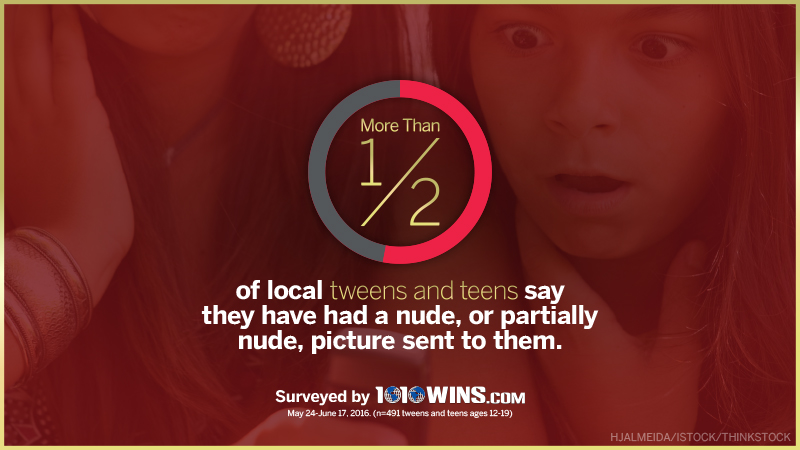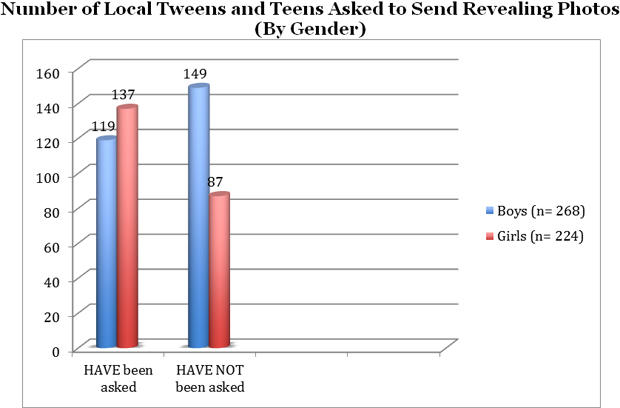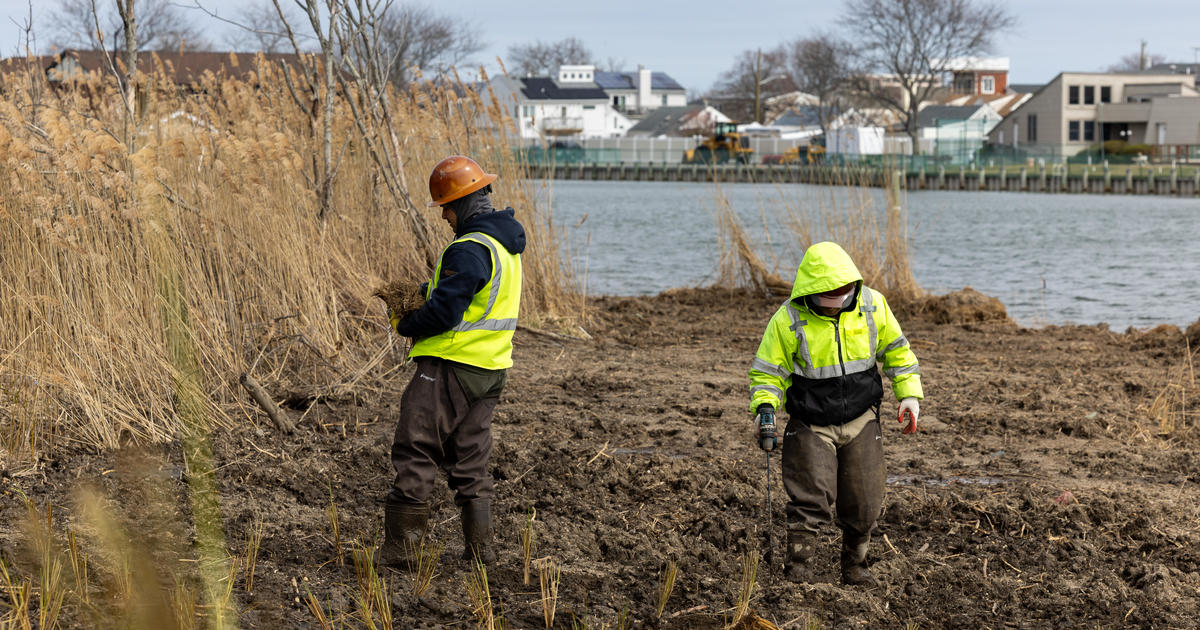Living In Live Time: Sex And Social Media
The letter "I."
In a string of any combination of letters, it can help to create so many words. But when it stands alone, it takes on an entirely new meaning. "I" on its own can stand for identity, individuality, and independence. In many ways, the letter "I" is how we define ourselves to the world and often reflects our own self-perception.
I am smart. I am beautiful. I am special.
When unaccompanied, that one letter can represent so much.
So how does just one letter impact what you see on social media? If you're near your phone, open Instagram and search #instagrambabies. The results will yield adorable photos of babies from all walks of life. Then search #instagrambabes and watch the sexualization take place before your eyes. Simply delete the "i" from the word "babies," and the pictures go from brimming toothy smiles to backsides and bikinis.
MORE: Social Media's Impact | In Their Own Words | Social Media And Your Brain | Cyberbullying | Surgery For Selfies | Parenting In The Social Media World | Join The #IDecide Movement
It's almost inevitable in this world of instant access and dating apps that in a matter of years, any baby girl pictured in a onesie online will either be asked to send a nude photo, receive a nude photo, or post hypersexualized content to create an online image that will garner "likes" and followers.
"The kind of pictures on social media that are rewarded, and that get attention, whether you're 19 or 13 or even younger, are often very provocative, sometimes semi-nude or cleavage bearing," said Nancy Jo Sales, author of the book American Girls: Social Media and the Secret Lives of Teenagers.
Young girls and boys who spoke to 1010WINS.com say the amount of explicit material accessible online has desensitized them to sexual content on social media.
"This threshold, this sense of what's acceptable and what's not acceptable, the bar has been raised so high, and this is the culture that kids are being raised in," said Dr. Jennifer Powell-Lunder, a clinical psychologist who specializes in social media's impact on teens and tweens. "So it empowers people. It helps people be able to feel like anything goes."
During May and June 2016, 1010WINS.com conducted an original survey of 492 tweens and teens, ages 12-19, from New Jersey, Long Island, and the five boroughs to get a local understanding of how social media impacts their lives. We found that approximately 20 percent of those girls surveyed said they have sent a nude, or partially nude, picture to someone.
According to Sales, sharing revealing content online can have a large impact on young girls.
"There's a lot of betrayal," she said. "A lot of girls told me they found it very hard to trust anyone because you can share things that were never meant to be shared, you can gossip about things that were never meant to be told, things can be spread around so quickly and so easily and one of the most damaging things that happens along those lines is the sharing of nude pictures."

In May 2016, many celebrated "National Send a Nude Day." Pop culture and the massive response to celebrities posting nude selfies has also contributed to the hypersexualized craze. This was exemplified when Kim Kardashian delivered her five-word acceptance speech at the 20th annual Webby Awards. She was presented with the first, "Webby Break the Internet Award." According to the organization's website, she received the distinction "for her unparalleled success online."
WARNING: Video contains profanity
The Spring 2016 Calvin Klein ad campaign fills the blank in this sentence: "I ____________ in #mycalvins" with words such as, "drift," "float," and "go beyond." It's also filled, for example, with the word "flash," as pictured in this post on Calvin Klein's official Instagram account. Although the comments have mixed reviews, the photo received thousands of "likes."
"I think all of this together creates this sort of very sexually explicit aesthetic on social media that really affects girls, really affects teenage girls, in terms of how they are pressured into presenting themselves, how they get "likes," how they get followers, how they get friends," said Sales.
But it's not just reaction to revealing celebrity photos or provocative ad campaigns that promotes sexualized content. The discourse online between friends, and strangers, quite often yields sexual comments. On a random day, a quick scroll through the app, Yik Yak reveals posts such as:
- "So horny, can't study. Any girls around want to help? I'm a cute guy."
- "Any kinky girls on here?"
- "I'd lick your p**** for hours."
To find out how quickly someone can access nude photos from a stranger and how fast a conversation can become sexual online, 1010WINS.com went undercover as a female on the social networking site, Omegle.com.Watch the video below to see what happens.
Sales also says the Internet makes it very easy to access pornography, which has added to the hypersexualized online environment.
"There's a lot of pornography on social media and kids, whether or not they are searching for it, will see it," she said.
Powell-Lunder says that while there are many girls who do not send nude photos, in today's society, they have to compete with the "porn star image" and they are "being sent mixed messages" that "everyone does this [send nudes]."
The chart below illustrates the amount of tweens and teens surveyed by 1010WINS.com that said they have been asked to send a nude, or partially nude, picture to someone. The results reveal that a larger number of local girls in the survey have been asked to send revealing photos as compared to the boys.
When a guy's greatest sexual fantasy is just a click away on his favorite porn site, and the girl he has a crush on is just a text away, the line between fantasy and reality can become blurry. Boys will often ask girls they are dating, or sometimes girls they have just met, for revealing photos. When those photos get into the wrong hands, it can be very damaging to a young girl's reputation.
A 2014 study published in the Journal of Community Health Nursing focused on "14 young adult females" and "their perceptions of risky social media behaviors." In the study, 71 percent of the women "reported that they, or someone they knew, had engaged in a risky social media behavior within the past year."
Once the content is out there, it is almost impossible to take back. In the study, the women "discussed the emotional impact associated with losing control of images and postings...they expressed concern that engaging in risky behaviors may change the way people perceived them and the way they perceived themselves."
"I've worked on so many situations where kids have pictures that they've posted or maybe...a picture they took or sent to an individual went viral, and they are now dealing with the consequences of that," said Powell-Lunder. "They need support. They need help from their parents and the other adults in their lives to guide them."
So why do some young women say "yes" to sending revealing photos? Girls and boys who spoke to 1010WINS.com say part of the reason has to do with getting labeled a "prude" if the girl doesn't comply with the request.
"They [the girls] see it as something that guys don't think is desirable," said Powell-Lunder. "That it means that they're really, really conservative, and...from a developmental standpoint, you're talking about a time where you're more prone towards high risk behaviors. Where the world's the limit...so to be called a prude is to be put into a box that says I'm not exciting."
Boys send nude photos as well, but girls we spoke to say they feel that they are held to a different standard in which they are asked for the revealing photos or videos, and then are more often ridiculed when they choose to send them.
Some also say, though, that posting or sending these images is an expression of feminism, allowing girls to show that they are proud of their bodies.
"Now it's like a lot more girls are doing it [posting revealing pictures] and not necessarily because they're promiscuous or anything, but it's kind of like, 'Oh I'm confident so let me show my body on the Internet,'" said 24-year-old Gabrielle, a volunteer at a mentoring program for girls at Uniondale High School. "But why can't it also be, 'I'm confident, I don't need to show my body on the Internet?'"
Powell-Lunder says some boys and girls are using their social media voices to do just that: speak out to defend the decision to keep their bodies private.
"When kids have a voice, it's very powerful," she said. "So what we need to see is more encouragement of using social media in a way that can empower kids in healthy ways."
Dating And Social Media:
The connectivity of the world today has impacted the way in which people meet and date. That includes teenagers, many of whom meet on social media sites and dating apps such as Tinder, Bumble, and Hinge. According to its website, Tinder says it generates 26 million matches per day.
Social media's ability to allow individuals to meet others and find romantic connections can be very positive. Dating apps and sites are responsible for many happy couples and marriages. The constant access can also allow people to keep up with their relationships by staying in touch at a more frequent rate.
A report released by the Pew Research Center in 2015, said "among teen social media users with relationship experience...59 percent [of those surveyed] say social media makes them feel more connected with what is going on in their significant other's life."
However, the report also found that, "among teen social media users with relationship experience...27 percent [of those surveyed] say social media makes them feel jealous or unsure about their relationship."
Many girls tell 1010WINS.com that the ability to monitor when someone is online, or see when one's significant other reads a message, can breed frustration in relationships if responses don't come quickly enough. On some apps, the ease of "swiping" left or right to decide on a potential dating partner can also create insecurity in relationships. When partners get into a fight, rather than working through problems, many find it easier to just move on and "swipe" to find their next connection. Social media has allowed unprecedented access to others, and having multiple options can often create relationship uncertainty. These feelings can attack the self-esteem of young girls and boys alike.
The same issues that affect young girls online can impact boys as well. Rutgers University seniors, Josh and Matt, sat down with 1010WINS.com to talk about how social media can create insecurity in their relationships.




